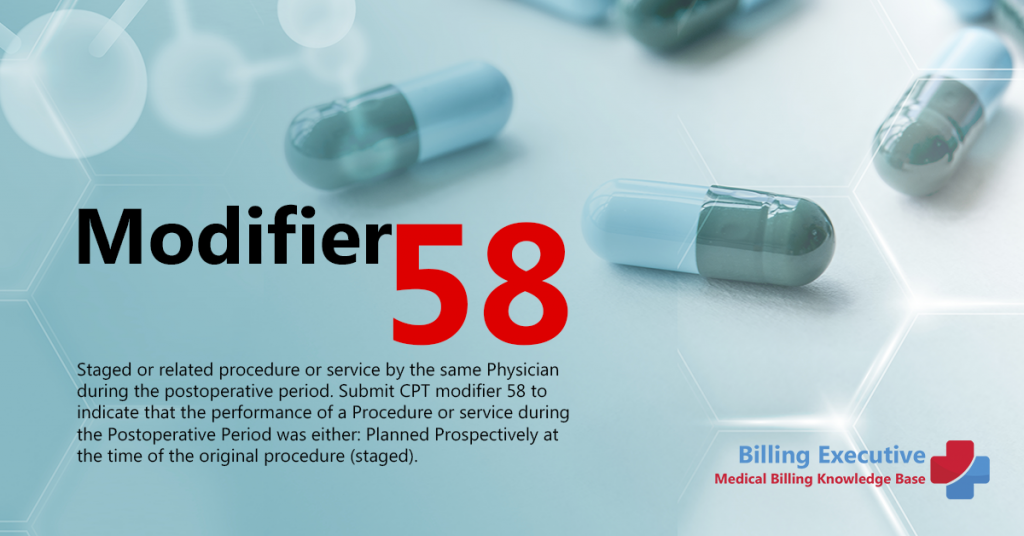Choosing when to employ modifier 58 necessitates precision to ensure that this modification is executed correctly. The coding staff is frequently unsure when modifier 58 should be used, resulting in annoyance and headache. Let’s begin the clarifying process by learning the methods and scenarios for which modifier 58 is intended. Then, we’ll go over clinical instances to see when modifier 58 should be used in practice.

Modifier 58 Basics
CPT defines modifier 58 as staged or related surgery or service performed by the same physician throughout the postoperative period. Furthermore, modifier 58 implies process was:
- Scheduled, either at the time of the first processor in the future.
- The second treatment is more comprehensive than the first.
- Following a diagnostic surgical operation as a form of therapy.
There is some ambiguity here because CMS does not specify whether the requirements above are separated by ‘or’ or ‘and.’ However, it is commonly considered that the circumstances are either/or cases. Each of them can trigger the use of modifier 58 on its own. CMS explains that the following procedure in the sequence begins a new postoperative period for monitoring and billing.
The key to modifier 58 is that it usually covers a process that the doctor was aware of before the conclusion of the initial linked operation. Some people believe that the physician must expressly mention the anticipated steps for an operation to qualify for the 58 modification. That is not true. The following procedure can be within a defined plan of care, or it can be inferred, executing a more elaborate operation because the initial process did not accomplish the intended goal as expected.
Appropriate use
- Please report when surgery or service was performed during the postoperative period.
- Planned in before or at the time of the initial procedure.
- Following a diagnostic surgical operation, as a form of therapy.
- When a second or related treatment is performed during the postoperative time.
Inappropriate use
- Staged procedures do not include applicable to claims for a surgical assistant or services provided by an Ambulatory Surgical Centre.
- Does not apply to procedures having a global period of XXX.
- Reporting the therapy of a problem from the original surgery necessitates a return to the operating room or service that is not separately payable but necessitates a return to the operating room.
Modifier 58 Example
A surgeon performs sacral ulcer excision surgery. During the procedure, the surgeon is aware that she will need to do a skin graft on the ulcer site later. Modifier 58 will be applied to the skin graft because the clinician anticipated the transplant surgery during the original procedure.
Example 2
A gangrenous toe on a patient’s left foot was amputated since she had diabetes and significant cardiovascular issues. Because of her condition, the doctor suggested that she have her left foot amputated at the time of the surgery. Three weeks later, the doctor amputated the patient’s left foot. Procedure code 28820 (toe amputation) (90 global surgery period); Procedure code 28805 (metatarsal amputation) with modifier 58. The use of modifier 58 must be supported by documentation.
Facts
- A subsequent postoperative period begins when the following procedure in the staged procedure sequence is billed.
- Staged procedures do not apply to assistance claims during surgery or ASC services.
- Beginning the day after the initial surgery, it is used during the postoperative period.
Unfortunately, even if you code by CPT regulations, not all insurers will reimburse you correctly. Make sure that your personnel appeals any denied or bundled claims. The insurer’s evaluation of your documentation may result in payment for your services. Still, have questions on how to apply modifier 58 correctly? Don’t worry; billing executive has a skilled coding team that uses precise modifiers to avoid denials. To learn more about our medical billing services, please contact us at rcmexpertz@gmail.com
About us
Billing Executive – a Medical Billing and Coding Knowledge Base for Physicians, Office staff, Medical Billers and Coders, including resources pertaining to HCPCS Codes, CPT Codes, ICD-10 billing codes, Modifiers, POS Codes, Revenue Codes, Billing Errors, Denials and Rejections.
We have more than 10 years experience in US Medical Billing and hand-on experience in Web Management, SEO, Content Marketing & Business Development with Research as a special forte.
Learn More
How to Use Modifier 22, Unusual Procedural Services Guidelines?
How to Use Modifier 54 : Split Surgical Care
Updated List of CPT and HCPCS Modifiers 2022
Complete Medicare Denial Codes List – Updated
